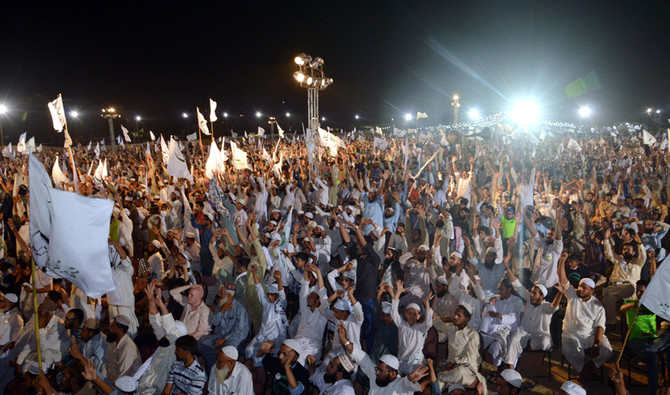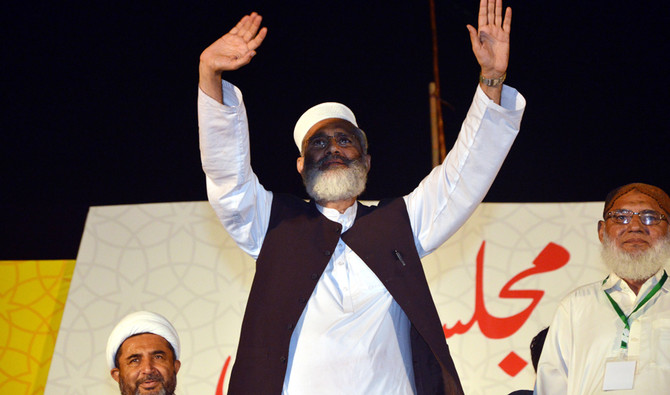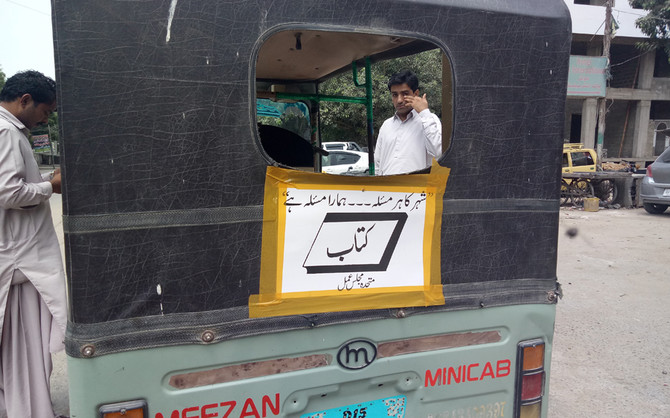KARACHI: An alliance of major religio-political parties which bagged 63 National Assembly seats besides forming a government in the North West Frontier Province — now called Khyber Pakhtunkhwa — in the 2002 general elections owing to its promise of Islamization and anti-American slogans in the wake of the invasion of Afghanistan, is now focused on civic issues in its political campaign.
Saifuddin Advocate is a candidate of the Muttahida Majlis Amal (MMA). The handbill he has dropped in homes of PECHS, an affluent neighborhood in his constituency, does mention the word Islam but at the bottom says: “We are the sons of Karachi. Every issue of the city is our issue.”
According to the leaflet the two-time elected Union Council chairman and head of Jamaat-e-Islami’s public aid committee is “a symbol of struggle for resolving the core issues of water, electricity and identity cards.”
In remote parts of Balochistan and Khyber Pakhunkhwa, the religious card may still be a major attraction but the religious alliance in the cities such as Karachi is addressing the issues about which the common man cares the most.
Islamization is still an integral part of the manifesto of religious political parties in Pakistan but leaders in the rallies are speaking more about core issues such as justice, economic reforms, load-shedding and the unavailability of drinking water.
The enforcement of system of prophet (PBUH), making Qur’an and Sunnah the law of the country, a Riba-free financial system, the implementation of the Islamic justice system and adherence to the constitution and upholding the rule of law, including the articles of Seal of Prophethood PBUH and its sanctity, are part of the MMA’s manifesto.
The alliance, which in its manifesto promised an “independent foreign policy,” not only wants to foster relations with all countries, with a special emphasis on Muslim countries with equality and objectives of non-interference in the domestic affairs of other countries, but says: “The relationship with China will be of supreme importance” and “The completion of CPEC will be the first priority.”
The alliance, which promises recovery of missing persons and seizure of abductions without a legal warrant, says: “The fight against terrorism of all kinds in order to stop interference of American, Indian and Israeli intelligence agencies is also on its agenda, which seeks strict implementation of the National Action Plan.”
Hafiz Naeem-ur-Rehman, president of the MMA, Karachi, said the implementation of a just Islamic system had always been a top priority but his party has also always focused on the issues that the public face.
“We have practically proved it after coming into power. Even our opponents have been praising our two former mayors of Karachi, Abdul Sattar Afghani and Naimatullah Khan, for the best deliverance,” Rehman said, adding that even when his party was out of power it made change. “We have been protesting and fighting a legal battle with K-Electric for our people. We have highlighted the issue of water and we have resolved the issue of identity cards,” he said, adding: “If we can do it out of power, we can do wonders when we will come into power.”
Rehman’s party, in its election rallies, also gives instances of Al-Khidmat, its charity wing, which is considered one of the top charity organizations of Pakistan.
Tehreek-e-Labbaik Pakistan
Tehreek-e-Labbaik Pakistan, commonly known as TLP, was born from a Barelvi movement against the sentence and subsequent hanging of Mumtaz Qadri for his crime of killing Governor Punjab, Salman Taseer.
TLP is contesting elections with 150 candidates from across Pakistan.
“We will make everything adherent to the Islamic laws. We will gradually abolish the Riba-based financial system and replace it with an Islamic one. We will focus on agriculture to strengthen the country’s economy,” Asad Hussain Rizvi, the TLP’s central leader and son of Khadim Hussain Rizvi, told Arab News.
The TLP also promises the “independence of Kashmir and construction of dams” to fulfill the water needs of Pakistan. The top two of its 20-point election manifesto promise implementation of an Islamic system and the establishment of a Muslim alliance for fighting with enemies of Islam.
Pakistan Rah-e-Haq Party
Pakistan Rah-e-Haq Party (PRHP), a political front of the proscribed Ahle Sunnat Wal Jama’at (ASWJ), speaks about the implementation of the system of the Khulafa-e-Rashideen (Rightly Guided Caliphs) in its election rallies but it has mainly focused on very local issues. In District Malir, from where its chief Allama Aurangzeb Farooqi is contesting for the National Assembly, the party is promising to resolve basic issues of the dwellers including roads, waters and electricity.
“We have planned to resolve the issues of fishermen and development in their areas,” Farooqi, who will need votes from fishermen, told Arab News, adding he will also put an end to sea piracy and arrest of the fishermen. The group’s popularity can be gauged by the fact that candidates of all mainstream parties have sought its support.
Majlis Wahdat-e-Muslimeen
Although not proscribed like the Sunni sectarian outfit ASWJ, this is a sect-based Shia group contesting from 18 seats throughout Pakistan. In Sindh, the group has done seat adjustment with Pakistan Tehreek-e-Insaf and has entered into an alliance with Imran Khan’s party in Punjab too.
“We will make Pakistan once again a Pakistan of Quid-e-Azam and Allama Iqbal, which was Islamic democracy and would guarantee rights of all, including religious minorities,” Asad Abbas Naqvi, the MWM’s central spokesman, told Arab News.
“Free foreign policy and construction of small dams will remain our priority,” Naqvi said, adding that his party will also strive to implement a system of proportional representation.
Milli Muslim League (MML)
Milli Muslim League (MML), the political front of Hafiz Saeed’s Jamaat-ud-Dawa (JuD), which has fielded nearly 300 candidates from across Pakistan, says it will not leave the field open for other “exploiters and oppressors.”
“Whether Hindus of Tharparkar or Muslims of Balochistan, all have benefited from the great services rendered by Falah-e-Insaniat Foundation (FIF),” said Dr. Muzzamil Hashmi, the MML vice president, who had been heading the Jama’at-ud-Dawa’s charity wing.
Becoming more adaptive
Muneer Ahmed Farooqi, a senior analyst with special focus on religious groups, maintained that the religious groups have learned to adapt to the new situations. “In 2002, the anti-American slogans could work, so the MMA raised those slogans and the result was in its favor. Theoretically, masses want Islam but when it comes to election, they vote for those who address their basic issues.”
Farooqi said that most of the religious groups, especially alliance of religious party, are focusing on issues such as scarcity of water, provision of basic utilities, load-shedding, a bad justice system, which affect the people mostly.
“The non-deliverance by major political parties has provided the religious party with a perfect chance to attract voters and they are trying to exploit the situation in their favor,” Farooqi said.

































